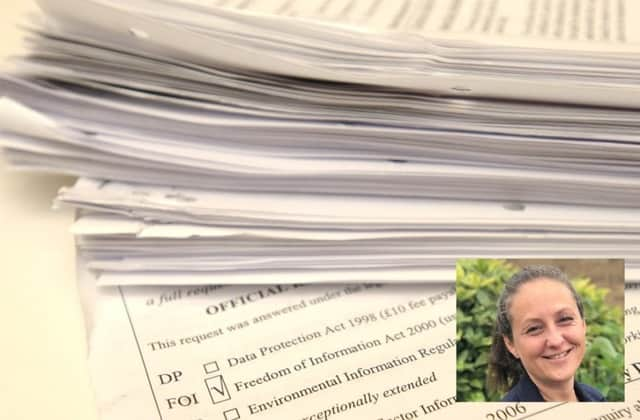OPINION: The opaque world of Government transparency


And so the Freedom of Information Act came into being during the early 2000s.
A new era of transparency began on the back of FOI - with publication schemes giving us our first look at ‘big data’.
Advertisement
Hide AdAdvertisement
Hide AdRegional government offices proactively gave us easier access to statistics on all manner of subjects including immigration, the jobs market, house prices, school expulsions, the nature of crimes committed, court statistics, flood areas...
But during the past decade, that openness has been replaced with a will by Government departments to keep an iron grip on their PR.
The authorities started their own social media sites and began to claw back some of the ground that had been given up during the 2000s.
They suddenly found they could control the message and broadcast it to a large audience on Facebook.
Advertisement
Hide AdAdvertisement
Hide AdWhy speak to the local media when they could promote their own operations without scrutiny from journalists?
And so the slow strangulation of information began.
Government comms staff, once so helpful, now ‘mmhmm’ along to our request on the phone then ask us to ‘pop it in an email’, shutting down the conversation and avoiding giving out any information that could emerge from a frank conversation.
If we’re really lucky we get an email with noncommittal answers to a quarter of the questions we asked.
We recently asked the Health and Safety Executive what it was doing to compel a developer to make safe a building site in Gretton which is threatening at least one other home. Our email has gone unanswered.
Advertisement
Hide AdAdvertisement
Hide AdThe Environment Agency was asked this week what it’s doing to stop flies invading homes in Priors Hall - a two-paragraph answer was sent with very little detail.
When rail commuters raised serious concerns about the future of services to Wellingborough, the private company that runs the franchise, Abellio, did not reply to our requests for comment.
Our reporters have a battle just to try to get our hands on the daily magistrates’ court lists which legally must be made available by Her Majesty’s Courts and Tribunal Service each day.
Unfortunately this precedent set by the national authorities is now trickling down into local government.
Advertisement
Hide AdAdvertisement
Hide AdOur councils have recently been holding meetings behind closed doors to make decisions to borrow money to buy up land and buildings to rent out to the private sector. And not only do they not tell us before the deal is done, most of them still try to keep it quiet after they’ve bought the buildings.
We’ve even been told that some councillors at more than one authority in Northamptonshire have been placed under pressure not to speak to reporters.
Let’s remind ourselves of one of the seven principles of public life: “Holders of public office should act and take decisions in an open and transparent manner. Information should not be withheld from the public unless there are clear and lawful reasons for doing so.”
Advertisement
Hide AdAdvertisement
Hide AdBut what does it matter anyway? Well, government press officers, office-fulls of them, are being paid by you, to keep things secret from you: Matters of public interest, funded by public money.
Who wants to know how those who run our rail network, being subsidised by the taxpayer to the tune of £5bn per year, are performing? Well, we do, when we want to get on a train to London and suddenly find there isn’t one.
Who cares if local councils don’t tell us they’re gambling on the property market? We do, when the property market stumbles and the rental income that our councils had been relying on disappears.
And if these authorities are not willing to speak to us, we should all be asking what exactly it is they have to hide?
Advertisement
Hide AdAdvertisement
Hide AdAmong the gloom is one example where being open with the press can work to your advantage.
Despite problems with the Freedom of Information Department, under new Chief Constable Nick Adderley, and with a new outlook from the communications team, Northamptonshire Police have altered public perception of their force in a few short months.
Officers tweet about the ups and downs of their jobs, reporters have been invited in to join live operations and Mr Adderley has done interviews on a range of topics, good and bad. The force has even opened up to the TV cameras on 999: What’s Your Emergency.
And, just look, a wave of great headlines..
..proving that shining a light on your own work might just be the way to go.